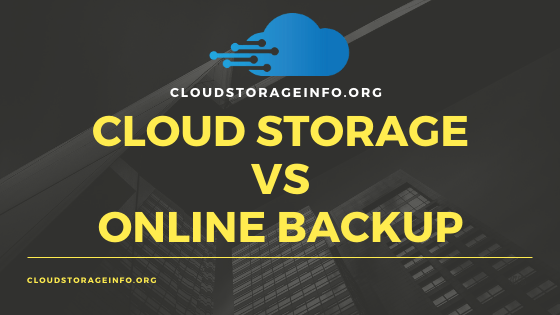
Cloud Storage vs Online Backup
Decision awaits you – cloud storage vs online backup. With the advancement in technology, you do not need to store or backup your data to your local drives. Now you can do this easily with cloud storage or online backup. These two offer much better safety options than local drives. However, which one of these is better for you? There is a lot of discussion over the internet which one is more suitable for who but it all comes down to your needs. In this article, I will analyze these two and let you decide which one suits you better.
Cloud storage
This is by far the most commonly known form of remote data storage. Nowadays, we collect a lot of data using our smartphones and also our personal computers. Using traditional local drive storage, we clatter our devices with unnecessary data and as a result, these devices become slow to operate. However, all this has a solution using cloud storage. Cloud storage simply means storing data on remote servers. This data can later be collected from a host of different devices that have been connected to the cloud.
The major benefit cloud has over traditional form of storage (hard drives, compact disks, flash disks) is that it reduces the clutter and unnecessary baggage. Instead of an external hard drive you simply connect to the internet through a device and retrieve all the data you need. You can access data anywhere you are and also share it with your coworkers or friends.

How cloud storage works
As I mentioned above cloud storage is simply storing your data in servers which are a third party instead of storing the information on your computer’s hard drive and other local storage devices. The internet is the link between you and your stored data. For example, say you have important and very useful information that you want to keep safe but not on your computer. What do you do? You register with a cloud storage provider who will give you a password-protected account to store your data. You login to this account and upload this confidential data that you need to be stored. Once uploaded, this information is encrypted and stored on a server somewhere around the globe. When you need to access the information, you get an internet access and download the data to whatever device you are using. Depending on the storage system and the provider, you can allow other people to access this information.
Examples of cloud storage providers:

Benefits of cloud storage
Before going for cloud storage look out for the following features.
- Automatic synchronization
Services with these features will update files to reflect any real-time file edits. If you are in business go for service providers with automatic file sync.
- File sharing
Also one of the biggest features of cloud storage. Sharing your files is as easy as creating a link and sending it to your coworkers. Grant him editing rights to your folder or just send him the download link. You can do it all – setting up passwords, expiry dates and more, depending on the cloud storage provider.
- File versioning
Service providers that have file versioning features allow you to edit your files without overwriting the old ones. The new versions are saved side by side with the old ones. This can be important especially if some important information has been overwritten in the new files. Most providers have this feature but will only maintain a limited number of edited file versions. Some even go ahead to delete the old files after a set period. However, you can still retrieve this after it has been deleted.
- Enabled file editing features
A vast majority of cloud storage providers allow users to view and edit files from the cloud using any connected device. After making the edits the updated version is synced to the other devices for easy access.
- Encryption
Security is the reason why we all go for cloud storage. If this is compromised all your business and personal data will be lost, maliciously edited or even sold on the black market. Before choosing a service provider, ensure that they encrypt your data before it is uploaded to their servers. A good company allows you to pick your own encryption key so then only you know it. Also, it is advisable to password protect your work and set out different levels of access to different ranks of employees. Client-side encryption and zero-knowledge privacy are the things you should look for.
- Price
Consider your business or personal needs first before choosing a service provider. Small businesses require storage capacity that can sufficiently accommodate slightly more than 10 employees while large companies want a large storage that comes with top-notch features. Different cloud storage providers offer different plans to choose from. Some come with limiting storage space but at a low price and progressively become expensive as space go up with additional features. Go for the features that not only reflect your business but also grow with it.
- Customer care
We are at the digital age. Technology is everything but can at times break down. Look out for a service provider that will provide your files as needed and at fast speeds. Look out for the technical support services, the rate of response to issues raised and any additional help services.
Online backup
The technical description of this is the use of a third-party service provider to backup data remotely over the internet. Online backup is also known as a remote backup. Today, it is the easiest and the simplest most secure way of backing up the most important documents eliminating the risk of exposure of important files or losing them when you back up in local drives. It’s also automatic which spares you a lot of time and money in the long run.

How online backup works
Customers using a high-speed network connection can backup specific essential files or the contents of the computers’ hard drives depending on their needs to the online service provider using a browser as the interface. Usually, the software is installed on your computer which automatically uploads your work to your online backup account. This is mostly done on a scheduled basis.
By saying online you know that it requires a network to work. The backup service provider gives you a web-based console where your backup data is stored and monitored. This data is usually encrypted and only you and the service provider have the decryption key. This data is stored on the service provider’s servers and archived hierarchically depending on the filling system. You as the customer can access this data from any device and from any location through the internet.
Most of these services are usually subscription-based and the payment prices depend on the storage space. The bigger the space more expensive it is. However, there are various techniques that the service providers use to reduce the size of your data. One way is deduplication. When faced with identical files, only one is selected for backup. Also, they use incremental backups to upload changes done to a file rather than backing up multiple copies of the file.
Examples of online backup service providers:

Benefits of online backup
- Safety
This is the main concern of everyone with a business relying on computers. At the end of a business day, the data is usually backed up, eliminating the risk of hardware failure. There is the added safety that the data is encrypted and stored on secure servers and systems in the cloud minimizing the risk of theft or cyber-attacks. This simply means that your data is 100% safe from any harm.
- Easy access
As mentioned earlier in the articles, the data is backed up in the cloud. This means that the data is virtual and stored on interconnected servers. What this means is that you can access this data from whatever point of the globe as long as you have internet access.
- Convenience
Online backup eliminates the need to back up your data on physical drives and stores it manually in safes or special rooms. Also, since the backup is automatic, it reduces time waste of manually doing the process and 100% eliminates human error in backing up the data. This frees you to solely concentrate on your work without having to worry about it.
- Reduced costs
Online based backups are far less expensive than buying hard drives and other physical media that store your data. This also goes with the reduced cost of transporting these storage media and setting up a physical location for safekeeping. Also, the IT labour is significantly reduced.
Features to look out for when selecting online data backup
Online backup unlike cloud storage offer their spaces in gigabytes and using the automated backup software, backs up you’re the data you have selected automatically following a schedule. cloud storage requires you to do this manually.
- Storage plans
Just like cloud storage choose a backup system that reflects your business and grows with your business. There are many providers that sell out different plans – Some offer fixed storage space for a fixed price while you can pay only for the storage you’re using with others.
- User interface
The backup application must be easy to understand and use. Look out for Windows-based software. these are far much easier to use without the unnecessary headaches.
- Reliability of the software
Like any other business out there, most will be sweet on words but will only offer you half of what they said. Backup systems are far the most important feature of a business to leave out to chance. Look out for a service provider with a reputation and a good review. Also, choose a service provider whose application suits your company’s operating system.
- Security transfer
Security is why you are choosing to back up with an offsite provider. Insist on a provider whose features meet the HIPAA and SOX/ Accounting Security Requirements. Also, almost all service providers use 128-bit AES Encryption and SSL Security features. These are industry standards.
- Customer support
Like with cloud storage, you should look out for a service provider with a great customer care. Technology fails and that can occur during office hours. Look out for providers who boast 24/7 customer care support and who will also provide technicians that can help you in case of disk failures.
Other features to look out for are.
- Free trials. This can be beneficial when you want to get the feel of their systems.
- Version tracking. Look out for providers that can back up several versions of a particular file. Most delete duplicated files or old versions of edited files.
- Proof of infrastructure. Is the data centre running the servers owned by the service provider or co-owned? Also, does the service provider have multiple data centres in case a natural disaster strikes?

Cloud storage vs online backup
Online backup systems have been around even before cloud storage came into being. Online backup was an additional feature where data was stored in gigabytes at a certain price. Cloud computing is what brought about cloud storage. While the two can seem familiar there are some individual differences. Such are:
- While online backup allows you to back up selected data and restore deleted files to your computer, cloud storage, on the other hand, synchronizes whatever is in your device to your online storage, i.e any edit of whatever is in your hard disk is replicated on the cloud.
- Cloud storage usually includes great sharing options while online backup provides none.
- Certain online backup providers send you physical copies of your backed up data if something goes wrong. That’s not the case with cloud storages.
- Cloud storage is meant for usage on a daily basis – Uploading, downloading, sharing, retrieving documents and other files. Go with online backup if you want to set it up to achieve the additional safety. Once set up simply forget about it.
Conclusion
Cloud storage and the online backup offer similar services with only a few minor differences. Depending on your budget and business needs choose the one that suits you the best. If you want to access on multiple devices, sharing and collaboration features, go with cloud storage. If you want only a portion of your work to be backed up go for online backup and forget about it once installed.
Check out my top cloud storage list to find the best solution for you.
What are you using – cloud storage or online backup? Let me know in the comments section down below!

Hi Dejan,
I really enjoyed reading your post. I have to admit that so far, I was mainly using Cloud Storage. For backup purposes, I use a home built NAS that utilizes RAID 1 to backup data internally across two independent harddrives. That’s a good solution for my scenario, however, I need to be aware of the fact that in case of a fire, or theft etc. all my data will be lost. Something that cannot happen to you with an online backup service!
Whether you’re using cloud storage or online backup, one needs to be aware of the fact, though, that you deliberately hand out your data to a third party! When I store data in my Dropbox folder, I have to constantly remind myself that this data is now stored on a server SOMEWHERE in the world, and that Dropbox itself and potential hackers might get access to that! So if you’re using cloud services, always make sure that you do so with that knowledge in mind.
Be careful and make educated calls when dealing with the new “cloudy” IT world, that’s all I’m trying to say 🙂
Cheers,
chris
Hello Chris,
Can’t agree with you more on that. You can’t be careful enough but I believe you should not give up on cloud storage just on that basis. I believe one should be careful and use the benefits that cloud storage offers at the same time. You just need to simply make sure the files you’re uploading are either: Of no meaning to you or you simply protect & encrypt them before uploading them. You can also go for a zero-knowledge cloud storage that can’t access your data at all.
Dejan